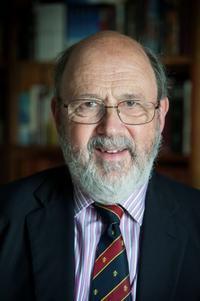The present COVID-19 pandemic impacting the globe is a time for lament, patience and faith, according to renowned biblical scholar, Dr. NT Wright. Christian leaders, as in the days of the early church, do not need to figure out the role of God, but rather spring into action and be a Christian service and help to those who are suffering.
 Dr. Wright is a Senior Research Fellow, Wycliffe Hall, University of Oxford. He will also be an Adjunct Instructor in the Entrepreneurial Leaders Programme offered by ELO in collaboration with Wycliffe Hall from August 16th – 22nd.
Dr. Wright is a Senior Research Fellow, Wycliffe Hall, University of Oxford. He will also be an Adjunct Instructor in the Entrepreneurial Leaders Programme offered by ELO in collaboration with Wycliffe Hall from August 16th – 22nd.
Dr. Wright was the guest in an ELO Webinar on April 7th on the topic of, “Christian Leadership in the Midst of a Pandemic.” Dr. Richard (Rick) J. Goossen, Chairman, ELO, did a Q & A with Dr. Wright and facilitated interaction with an international audience.
The webinar was heavily oversubscribed with participants registered from around the world. There was a steady stream of questions, from India, Asia, North America and Europe.
Here is a summary of some of the insights from the conversation with Dr. Wright, which have been paraphrased and summarized for brevity.
NOTE: For the exact context of Dr. Wright’s remarks and a word-for-word record of his comments, please refer to the webinar recording. The below summary is not be quoted as the exact words of Dr. Wright. Thank you.
RG: How do Christians respond to the present pandemic?
The present pandemic is a call for wisdom and in the Bible, wisdom doesn't mean just knowing everything, it means having the insight to know what you can do and should do and perhaps that also includes knowing what you can't do and shouldn't try to do.
RG: Is the early church a model of a community that responded to those in need?
When the church in Antioch hears of a need (Acts 11) the church doesn't say, oh, we've got to figure out what we learn about God. Instead of trying to get some grand theory about what God may be doing in a kind of cosmic sense with all of this, there is a very hands-on practical response.
RG: How do Christians live their calling in the midst of these circumstances?
The Bible has plenty of instances of lament including, of course, the Book of Lamentations. These present circumstances are sometimes where the people of God have to be. I think of Psalm 88, which is so bleak and dark, or Psalm 89, which starts very cheerfully and then suddenly everything goes horribly wrong. The sum is just to leave it in God's hands.
Calling is to discern the moments which are moments for lament, rather than for grand theories which can be a way of avoiding the hard work of tears, of actually grieving with the grief of the world. I think of the groaning of all creation in Romans 8, which is one of the great chapters in the Bible. It isn't the church’s job to sit on the side and say the world's having a bad time. The church’s job and that of the leaders of the church, anyone with a Christian calling, is to be able to hold onto that pain in the presence of God, not knowing really what we should be praying for at this particular moment, but trusting that the spirit is groaning within us and pauses when this happens. We are being formed in the pattern of Christ.
RG: The solution is not simply that God will take away pain and suffering?
In the ancient world, everybody knew life was a mess. You don't find the early fathers, saying, oh dear, there's an earthquake. They knew that earthquakes and famines happened and their job as followers of Jesus was to be there, where the pain was, and to be in prayer at the place where the world is in pain so that they could then be of help. As far as they were aware the world was in pain. When a great plague would strike a city in the ancient world all the well-to-do people would get out and run. The Christians would stay and nurse people. Afterwards, people would say why did you do that? Some of you died. Nursing us was not part of your plan. They would say we are followers of Jesus. This is what we do. We're here for the world. I fear that sometimes we Western Christians have got a kind of a would-be Christian version of the Western Enlightenment Dream: health, wealth, happiness. That's completely upside down and inside out in terms of the New Testament vision.
RG: What is hope in these circumstances?
The Christian hope is anchored in two things. One, the promises of God in Scripture that one day the Earth shall be full of the knowledge and glory of God as the waters cover the sea. It's in the Psalms. In the Old Testament, there is the promise that God will put everything right at last. The second anchor is the resurrection of Jesus from the dead. That was the beginning of the putting right of the world. We Christians are called to live between the putting right moment being launched and the putting right moment being completed. And that means that everything that we are called to do is about putting things right. Making things right in our world.
RG: How is God in control of things and what is the purpose behind the pandemic?
The right response to an event always was and is lament and then the prayer of unknowing. The spirit groans within us. God did not want to make a world full of tragedy and pain and sorrow and suffering. God does not sit upstairs and pull strings like a puppet master. God always wanted to be part of his own creation and its life. When humans rebelled against Him, He didn't say, OK, I will scrub that. God found the way to come himself in the person of His son to be at the center and heart of that suffering. The whole New Testament is written to say we look at Jesus first. I think of Jesus weeping at the tomb of his friend Lazarus or Jesus in the Garden of Gethsemane. He’s saying, isn't there another way? And this is somehow what it means for the one true God to become Incarnate. This is why for me the doctrine of the Trinity is about discovering and discerning that the true God is very different from the mechanistic celestial CEO God of popular imagination.
